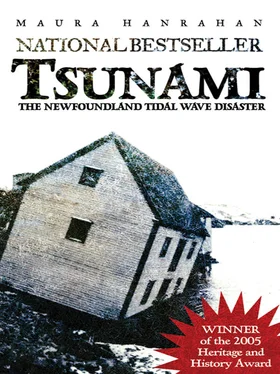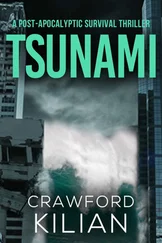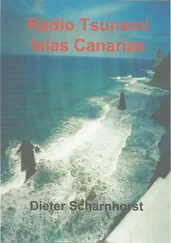“You’re not scared, are you, Job?” John teased.
Before Tom could answer, his wife, Jessie, appeared at the door, followed by the couple’s three daughters, Gertie, fifteen, Harriet, eleven, and Hannah, only nine. The two youngest girls held hands and Tom noticed that Hannah was walking on her tiptoes as if to protect herself from the rumbling of the earth.
“What’s going on, Tom?” Jessie asked urgently.
“I don’t really know,” her husband answered. “It must be some kind of earthquake, though they’re not generally known in Newfoundland. Usually they happen in warmer parts.”
“God save us!” said Jessie.
He looked at his daughters and then at white-faced Job.
“It won’t last long,” he said. “And it won’t be a powerful one like they have in the West Indies. Don’t fret now.”
Little Hannah looked up from under her chestnut curls and smiled at him. Tom winked at her. As the tremor died away, Jessie shooed her girls back to the house. Tom watched their long skirts swish as his wife and daughters went inside.
Not long afterwards, a wall of seawater rushed into the Fudges’ garden and pulled the family’s house away with it. Tom was still working in the nearby store with his sons. Oddly, the smell of kelp and salt filled Tom’s nostrils before he heard the roar of the wave. The smell jolted him and he jumped to the doorway to see rushing grey water where his house had been. He let out a deep cry and froze. Then he shouted at John and Job, “Get to high ground! Move! Quick!”
The boys ran from the store toward the hills, joining their panicked neighbours. At one point John turned around and called, “Come on, Dad!”
But he could no longer see his father.
From the high land, Ern Cheeseman and dozens of other people saw Tom Fudge’s store swallowed by the tail end of the wave. They could hear the screams of women and children trapped in houses borne on the tidal wave, Jessie Fudge and her three daughters, among them. In short order, the first wave had torn eleven houses from the ground. It drove Bill and Mary Clarke’s twostorey, eight room house into Path End, a neighbouring inlet, where it would have to be towed down. It destroyed the house of Gus and Jessie Abbott and their six children and that of their kin, John and Annie Abbott, and their seven children. It swept away the house of eighty-one-year-old pensioner William Allen. Tom Fudge’s brother Job, after whom his younger son had been named, was in poor health; now his house was gone. John Dibbon, who lived alone, was homeless. So was sixty-seven-year-old Mary Dibbon, who was widowed by the tsunami . The house Thomas Brenton was building for his new wife, Alice, was engulfed by the tidal wave. Four of the Cheeseman households lost their homes to the violent water that night: those of fifty-five-year-old widower Thomas; twenty-three-year-old bachelor Joseph; and married couple, Jeremiah and Harriet, both fifty-seven.
As the first wave emptied the harbour, Ern Cheeseman and the others tried to follow what was happening, though their eyes could scarcely comprehend it. They tried to count the houses that were hauled up, and then to figure out who was on the high ground and who wasn’t. Ern saw young Job Fudge shivering on the hill not far away. Though he was well-dressed for a November evening, Ern realized the boy must be in shock. He approached young Job.
“Where’s the rest of your family, Job?” he asked gently.
“John is near the bottom of the hill trying to find Dad,” Job answered, his eyes staring at the dot below that represented his brother.
“And where did you last see your father?” Ern persisted quietly.
“Our house is gone and Dad’s gone to get it,” Job said. “Mommy and Gertie and Harriet and Hannah are in it. Dad’s gone to rescue them.”
“Take my jacket, Job,” Ern said, laying his coat over the boy’s shoulders. “It’s getting a little chilly.”
Ern leaned back on a boulder that emerged from the earth and buried his face in his hands. There wasn’t a single store left in the harbour. The houses were all out to sea now. He couldn’t see Tom Fudge from where he sat. He could hardly see Job’s older brother. His helplessness was in danger of congealing into red hot anger unless he did something with it.
He rose again.
“Job, you stay right here,” he said. “Don’t move. Promise me that. I’m going to get your brother.”
Ern bolted down the hill until he reached John.
“Come up to the high ground with me,” he ordered the young man. “Your little brother needs you.”
“I’ve got to find Dad,” John protested. “Mother and the girls are swept away.”
“I know,” Ern said. “I’m sorry. But that wave is going to come in again—look at how empty the harbour is. And it might take you with it if you stay here. At this point you seem to be all Job has.”
John froze. “But my Dad… I… I…”
“Come with me,” Ern said, quietly but firmly.
John looked at the sea, then turned to follow his neighbour.
“We’ve got to hurry,” Ern added.
On top of the hill, Job’s shivering seemed to have subsided a little. The boy collapsed into his brother’s arms when he saw John. Not long after John and Ern reached the high ground, the second wave bombed its way into Port au Bras. It was even louder than the first. Now the hill was filled with the sound of mournful praying and cries of anguish and grief. The sobs of the Fudge brothers came full force now. They knew they had lost their sisters and their parents and were all alone in the world. Ern Cheeseman and their uncles and aunts made a ring around them in a vain effort to shield them from the pain they would feel for a lifetime.
The people of Port au Bras barely noticed the third wave, which tossed clapboard, barrels, and the remains of battered boats about the harbour. Turnips, heads of cabbage, and pieces of salt meat floated on the water. Ern Cheeseman wrote:
Everybody is miserable, nervous wrecks and in need of help immediately. All people who had food for the winter lost it in their stores. We must have flour, sugar, tea, molasses, beef, and pork immediately… Everything we have is gone and we are ruined…everything is dismal and breaks one’s heart to look at the harbour and then think of what it was like fifteen minutes before this terrible calamity.
Most worrying was the loss of boats and the damage to those that survived the tsunami . A schooner was damaged to the tune of one thousand dollars and its two large banking dories—which four fishermen worked from—swept away. A twenty-two-ton western boat needed repairs that would also cost a thousand dollars.
Eighteen-year-old Francis Bennett was in severe shock, long after the villagers emerged from the hill. His fifty-eight-year-old mother, Mary Ann, died in the tidal wave, as did his fifty-year-old uncle, Henry Dibbon. The young entrepreneur’s business was also completely destroyed. Francis believed in getting an early start in life; still a teenager, he was already married and a successful trader. Gone were his flakes, stages, trap skiff, banking dory, a thousand feet of lumber, a staysail, 145 yards of ducksail, ten oil casks, Fairbanks weights, and weighing beams and weights—losses worth $1,500.00. Though a young man, Francis was overwhelmed at the thought of starting all over again from nothing, especially in the face of his grief.
Yet, like many around Burin, Port au Bras was a prosperous village. John Bennett, who owned the damaged western boat, had $280 in the bank. John Dibbon, who was also without shelter and whose brother Henry had died, had two thousand dollars in the bank. George and Elizabeth Bennett, whose house had shifted four feet, breaking their two chimneys, had thirty-five dollars cash on them as well as $1,500 in a savings account. Not everyone was well off, though; fifty-four-year-old Ellen Brenton cried over the twenty gallons of berries she’d picked and the sea had stolen from her.
Читать дальше












